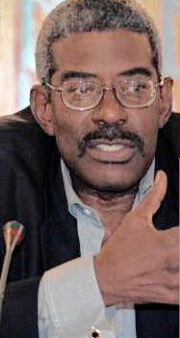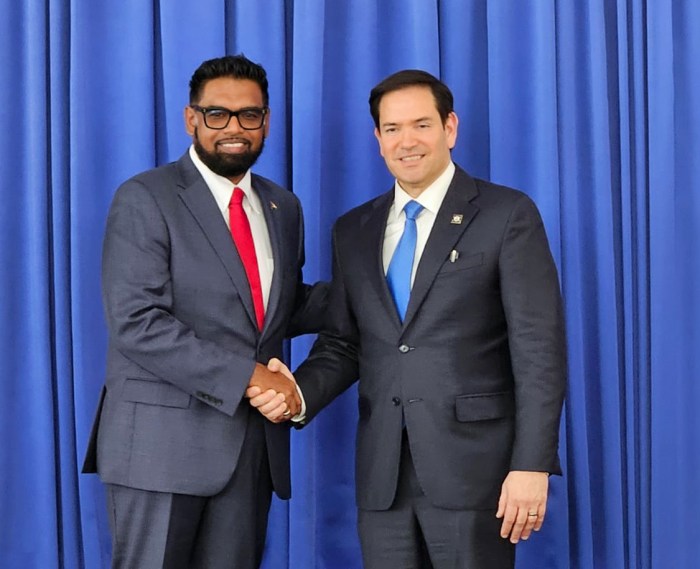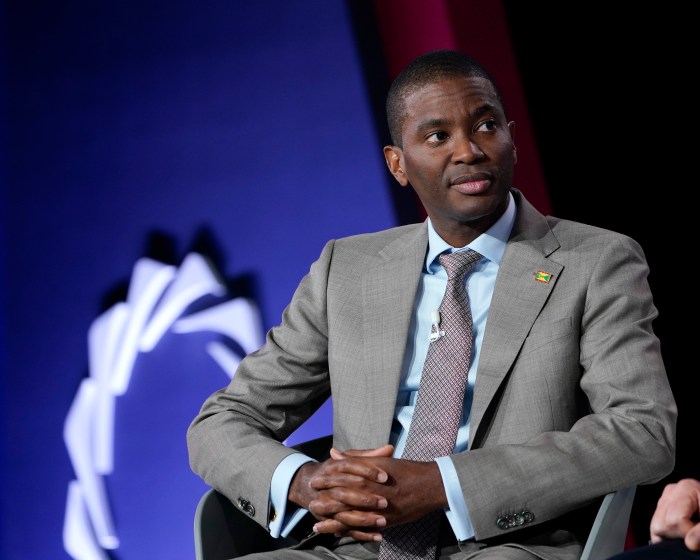All chapters of the meaningful life of Hugh Neville James Cholmondeley, one of Guyana’s most outstanding media personalities, ended by death on Aug. 10 after a battle with lung cancer which began February this year. As a measure of his significance, last Friday afternoon, Aug. 17, his family, current and former diplomats, colleagues, friends, admirers, members of the media fraternity and others, assembled at The Tillman Chapel, Church Centre of the United Nations, New York, in final celebration of his life.
Particularly obvious was the wide and solid cross-section of the emigrant Guyanese professional and intellectual classes, in addition to those who travelled for the occasion.
Cholmondeley, an old graduate from Queen’s College, which to date is the most highly rated Caribbean school, entered the media profession in 1958 at the then British Guiana Broadcasting Service as an announcer under the mentorship of Rafiq Khan. There, he probably became “the first Disc jockey in the Caribbean”. As the operator with responsibility for playing music was constantly late, Cholmondeley’s radio survival depended on learning and applying both announcing and operating skills, which classified him as “the first and original DJ” according to his eulogist Nigel Hughes.
From 1966-1968 he served as director of news and current affairs at Radio Demerara, but in 1968 established the Guyana Broadcasting Service (GBS).
In 1972 Hugh was appointed project manager of UNESCO where he designed and established the Caribbean News Agency (CANA ) and the Caribbean Institute of Mass Communications (CARIMAC) at Mona, University of the West Indies.
In 1977 he was transferred to UNESCO – Paris as a program specialist where he designed and administered communications and development projects for the establishment and expansion of news agencies in developing countries.
In 1979 he became UNESCO’S representative to the Caribbean, established his office in Jamaica where he functioned until 1985, when he was instrumental in forming the Consortium Graduate School in the Social Sciences in the Caribbean, a multi-university enterprise comprising University of the West Indies, University of Guyana and University of Suriname. This was also located at Mona. Cholmondeley was himself a student of the University of the West Indies, a Mass Communications and Broadcast Management graduate from Syracuse University, and University of Birmingham respectively.
In the words of Eddie Greene “ Hugh, who reveled in the realm of ideas and their application to improving the human and social conditions, quickly grasped the importance of full time graduate training that exposed young scholars to an interdisciplinary program in development policy study and research. The passion and dedication with which he piloted the process through the diplomatic and multilateral channels and then advocated at meetings of the Caricom and UN Councils were masterful displays of the craft of negotiation and talents of creative leadership”.
Between the offices of UNESCO and UNDP, Cholmondeley was charged with many responsibilities such as peace and reconciliation, development initiatives, etc. in places such as Jamaica, Rwanda and Sierra Leone, Haiti, Afghanistan, Liberia and Somalia, where he earned the respect and trust of General Aidid, who would attend secret meetings with him in a coffin at the funeral of fallen fighters.
In Guyana while he succeeded in realizing the negotiations leading up to the Herdmanston Accord and subsequently the St Lucia accord, and even became adviser to the chairman of the Guyana Elections Commission where he designed the media center, Cholmondeley remained discontented with the progress in Guyana.
Hugh Cholmondeley whom many saw as a gentle giant among men, capable of riveting presentations to an audience, was also described as incisive in mind, colorful and varied in vocabulary. But a former broadcast colleague, award-winning journalist Angella Massiah, remarked that “surprisingly he was a shy man”. This she noticed in 1992, when the North American-based Caribbean media personnel officially established its alumni in honour of Cholmondeley for his pioneering efforts in both print and broadcast journalism.
Cholmondeley at 72, left to mourn his widow Marieanne, five children from two marriages, and two grandchildren. He held a penchant for Mozart’s music as significant as his radio voice which broadcast aspirants longed to emulate. Several subsequent broadcasters were persons from the teenage generation of the 1970s, who just lingered around Cholmondeley’s place of visits, to admire his tall film-star gaits and persona with tinted spectacles, long cigarettes and shined MGB sport cars.


























